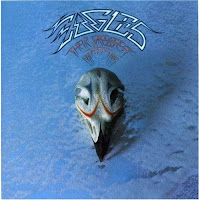 The collocation “Desert Island Discs”—DIDs— normally refers to a music critic’s list of revered recordings, usually consisting of ten (10) albums, as in Top 10. The term is derived from the question, “If you were stranded on a desert island, what ten albums (normally ten, out of respect to the commandments), out of all the albums you own, would you want to have with you?” Given the hypothetical nature of the question, it might just as easily be phrased as, “If your house were on fire, what ten albums would you grab on the way out?” Implicit in the question is the assumption that the critic compiling the list has hoarded, in a grossly materialistic way, more albums than he could ever possibly listen to (or rather, listen to carefully). Actually, the compilation of a “DIDs” list is a tacit admission by the critic that he really listens only to a small portion of the many hundreds (or thousands) he owns.
The collocation “Desert Island Discs”—DIDs— normally refers to a music critic’s list of revered recordings, usually consisting of ten (10) albums, as in Top 10. The term is derived from the question, “If you were stranded on a desert island, what ten albums (normally ten, out of respect to the commandments), out of all the albums you own, would you want to have with you?” Given the hypothetical nature of the question, it might just as easily be phrased as, “If your house were on fire, what ten albums would you grab on the way out?” Implicit in the question is the assumption that the critic compiling the list has hoarded, in a grossly materialistic way, more albums than he could ever possibly listen to (or rather, listen to carefully). Actually, the compilation of a “DIDs” list is a tacit admission by the critic that he really listens only to a small portion of the many hundreds (or thousands) he owns.
I vividly remember a conversation I had about ten years ago or so with my friend Mike Jarrett, a music critic himself and a world expert on jazz, when the topic of DIDs came up. In the context of a conversation regarding what each of us might include on a DIDs list, he paused to ask me a question that he prefaced by insisting he was asking in all seriousness. Of course, I said, ask it. Why would I think you were not asking a serious question? The question was this, brilliant really, which I’ve pondered many times in the years since: What makes up God’s record collection: Every record ever made, or just the best records ever made?
You don’t have to have any sort of conventional religious belief--even none--to answer the question. How do you answer it--not in a “theoretical” way, meaning, how “would” you answer it assuming the off-chance that someone ever asked you--but how do you? Does the most ideal of album collections in God’s place consist of all the albums ever made, or only the best (however the Almighty should decide that)? Is heaven (a desert island, of the tropical paradise sort) a place of plenty, of excess, of everything, or is it premised on the Puritan Principle of Parsimony—that is, DIDs. (When you go to heaven, in other words, and you’ve got only ten choices, what shall they be?) Is it all-inclusive, or exclusive? If you had your druthers, do you invite everybody, or only a select few? Certain Christian traditions, of course, tell us that those selected are an elite few—the Chosen. But I recall answering Mike’s question, “all of them. God has all of them.” Mike’s response was, “But does He listen to them all?” Isn’t this the real paradox of desire: Is desire polymorphously perverse (indiscriminate), or fetishistically perverse (rarified)?
I have never seen a list of DIDs that was really anything more than a particular critic’s fetishized list, selected from a standardized list of “Rock Greats”—the critic’s favorite Beatles album, favorite Rolling Stones album, favorite Pink Floyd album, Led Zeppelin album, Bob Dylan album—you get the idea. And outside of some occasional, unexpected flourishes—Cream, perhaps, or U2, Grateful Dead, Nirvana—the list never contains surprises. (Or, if it does, it’s the “Guilty Pleasure” sort, that is, the fetishized sort, meaning the critic "can’t explain it," "just likes it" sort, meaning it eludes rational explication--he’s a mystery even to himself.) In other words, we all know the critical darlings that are going to be there—Rock music’s Great Tradition—the suspense is simply finding out which album by the canonical bands happens to be the critic’s favorite (at the moment).
The problem is that many music critics are really just fans who’ve learned how to write and found a forum to expound from, fans in the sense that their judgment is uncritical—everything by the band (Beatles, Pink Floyd, fill in the blank) is great. Every song, every album, every note by the band is just as good as every other one. Now this just can’t be true--or can it?
By way of analogy, think of the work by a major literary figure—Shakespeare, for example. As Harold Bloom points out—Bloom being one of America’s best critics—had Shakespeare died at the same age as his contemporary, playwright Christopher Marlowe, and Marlowe lived on instead, Marlowe would have been considered historically the greater playwright. Shakespeare’s early plays do not have the level of sophistication and craft of Marlowe’s early plays. At a younger age, the fact is, Marlowe was the stronger playwright of the two. Of course, history is radically contingent: Marlowe was murdered, and Shakespeare lived, eventually composing the great tragedies upon which his reputation largely, and justly, rests. Likewise, of all the many volumes of his writings, the crucial importance of British poet Samuel Taylor Coleridge (author of The Rime of the Ancient Mariner) rests, according to Bloom, on a mere nine poems—but what a brilliant nine they are. In popular music criticism, most critics refuse to make such keen discriminations, partly because they are afraid history will prove them wrong, and so overestimate the importance of every album ("five stars"), or else invent an ad hoc system on which to base their judgment--yet another mechanism of desire--which is presented as “objective.”
Question: Is Meet the Beatles as good a record as the White Album? Or, alternatively: Does God have all the Beatles albums, are only the very best?
Some, rightly so, will cry foul and claim a category error: first I asked about records, and then I asked about albums. In an earlier post, I claimed the two were not the same, a record being a material artifact, an album a concept. But if an album is a concept, does God, then, prefer "Greatest Hits" packages, or the individual albums, in the sense of particular records? Example: Does God have The Eagles' Hotel California, or The Eagles' Greatest Hits? Or all of the individual albums, avoiding the Greatest Hits?
Thursday, March 27, 2008
DIDs: Of Records, Albums, and Theology
Saturday, March 15, 2008
Monday, January 25, 1960: el
According to John Tobler’s book, This Day in Rock: Day by Day Record of Rock’s Biggest News Stories (Carroll & Graf, 1993), Elvis Presley’s first RCA single, Heartbreak Hotel/I Was The One, was released on January 25, 1956--exactly four years earlier than the above date. (Certain web sources proffer a slightly later date, although the discrepancy is minor and ultimately insignificant.)
On January 25, 1960, Elvis had just about five weeks left in the Army. No one had yet heard of the Beatles; the band as such didn't exist. 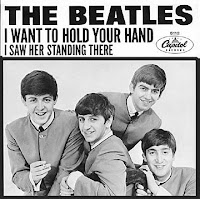 The band that would become the Beatles was still known as The Quarrymen--the band members hadn’t yet decided on the name The Silver Beetles. In a wonderful sort of symmetry, precisely four years later--January 25, 1964--the Beatles first American single, “I Want To Hold Your Hand,” was one week away from becoming the band’s first #1 hit on the American charts, where it would remain perched for almost two months. As everyone knows, 1964 was the annus mirabilis of the Beatles, during which they had nine different singles sharing either the #1 or #2 spot on and off throughout the year. Chart information for 1964 is as follows (courtesy Joel Whitburn, Billboard Top 1000 Singles 1955-1990, Hal Leonard Publishing, 1991):
The band that would become the Beatles was still known as The Quarrymen--the band members hadn’t yet decided on the name The Silver Beetles. In a wonderful sort of symmetry, precisely four years later--January 25, 1964--the Beatles first American single, “I Want To Hold Your Hand,” was one week away from becoming the band’s first #1 hit on the American charts, where it would remain perched for almost two months. As everyone knows, 1964 was the annus mirabilis of the Beatles, during which they had nine different singles sharing either the #1 or #2 spot on and off throughout the year. Chart information for 1964 is as follows (courtesy Joel Whitburn, Billboard Top 1000 Singles 1955-1990, Hal Leonard Publishing, 1991):
Song Title/Peak Date/Peak Position/Weeks at Peak Position
I Want to Hold Your Hand/February 1/#1/7 weeks
Please Please Me/March 14/#2/3 weeks
She Loves You/March 21/#1/2 weeks
Can’t Buy Me Love/April 4/#1/5 weeks
Twist and Shout/April 4/#2/4 weeks
Do You Want To Know a Secret/May 9/#2/1 week
Love Me Do/May 30/#1/1 week
A Hard Day’s Night/August 1/#1/2 weeks
I Feel Fine/Dec. 26/#1/3 weeks
In contrast, Elvis Presley had no songs in the Top 40 in 1964 (or 1965, or 1966, or 1967, or…). It wasn’t until late 1969 that Elvis had another #1 hit, his first big hit in many years. Instead of making records, he was busy making movies. During the years from 1960 (Post-Army, Pre-Beatles) to 1964 (Beatlemania), Elvis made the following movies, released in the following order:
G.I. Blues (1960)
Flaming Star (1960)
Wild in the Country (1961)
Blue Hawaii (1961)
Follow That Dream (1962)
Kid Galahad (1962)
Girls! Girls! Girls! (1962)
It Happened at the World's Fair (1963)
Fun in Acapulco (1963)
Kissin’ Cousins (1964) [Arguably his worst film, the absolute bottom of the barrel, infelicitously released at the onset of Beatlemania]
Viva Las Vegas (1964)
Roustabout (1964)
Hence, while Elvis was preoccupied with his movie career, the Fab Four were becoming one of the most famous bands in popular music history. The criss-cross that occurred in 1964 (one's fortunes up, the other's fortunes down, and I don't mean by fortunes "money") could not have gone unnoticed by either the Beatles or Elvis. In his biography, Elvis (1980) Albert Goldman writes:
No wonder then, that when the Beatles first came to America--welcomed on the Ed Sullivan Show by a telegram wishing them every success and signed by Elvis Presley (though dispatched without his knowledge by Colonel Parker)--Elvis refused point-blank to meet these dubious young men who aspired to the hand of his daughter, the American youth audience. “Hell, I don’t wanna meet them sons o’ bitches!” exploded Elvis when the Colonel ran the proposition by him for the first time during the Beatles’ initial tour in 1964. (Avon Books paperback, 1981, p. 447)
Elvis didn’t meet the Beatles until the third week of August 1965 (the event recounted with different rhetorical flourishes in different biographies) while in Los Angeles filming Paradise, Hawaiian Style (1966), which could be considered his worst film--if it weren't for Kissin' Cousins. He hadn’t been in the recording studio for years, except, of course, for the purpose of recording material for his soundtracks. After the Beatles met Elvis in August, the rest of 1965 worked out as follows:
The Beatles--Rubber Soul (album), December 1965 (U. S.)
Elvis Presley--Harum Scarum (movie), December 1965 (U. S.)
Thus the remark John Lennon made just a few months later, “We’re more popular than Jesus now,” uttered during an interview conducted on March 4, 1966, was made only after he and the other members of the Beatles had met Elvis. Michael Jarrett, in Sound Tracks, A Musical ABC, Vols. 1-3 (Temple University Press, 1998), interprets Lennon’s infamous remark as follows:
When John Lennon declared that the Beatles were more popular than Jesus, what’s the chance that he really meant--in Bible Code--that they were more popular than Elvis? In both Hebrew and the language of rock ‘n’ roll, El means “God.” Lennon, however, couldn’t bring himself to say what he meant. Why? It would have been sacrilegious. Remember, it was Lennon who said, “Before Elvis, there was nothing.” (84)
In other words, Lennon could not bring himself to utter the terrible truth. He could not say, “The Beatles have become more popular than Elvis,” but perhaps, nonetheless, that's what he meant. It’s worth looking at the entire infamous remark Lennon made in 1966, the following quotation taken from Newsoftheodd.com:
When they reached the subject of religion, Lennon said, “Christianity will go. It will vanish and shrink. … We’re more popular than Jesus now; I don’t know which will go first--rock ‘n’ roll or Christianity.”
What if he really meant the following? I have supplied the appropriate substitutions:
Elvis will go. He will vanish and shrink. … We’re more popular than Elvis now; I don’t know which will go first--us or Elvis.
Was Lennon consciously aware of what he really meant?  Could he imagine the improbability that he had displaced his precursor, the one who had, in a very real sense, made him possible in the first place? That he had, figuratively speaking, like Oedipus, committed patricide? What are we to make out of the following juxtaposition, each album representing the first formal studio recordings made by each of the artists subsequent to their August 1965 meeting?
Could he imagine the improbability that he had displaced his precursor, the one who had, in a very real sense, made him possible in the first place? That he had, figuratively speaking, like Oedipus, committed patricide? What are we to make out of the following juxtaposition, each album representing the first formal studio recordings made by each of the artists subsequent to their August 1965 meeting?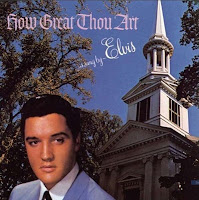
The Beatles: Revolver (August 1966)
Elvis Presley: How Great Thou Art (February 1967; recorded 1966 except for "Crying in the Chapel," 1960)
Sunday, March 9, 2008
Mondegreen Redux: Betty and the Jets
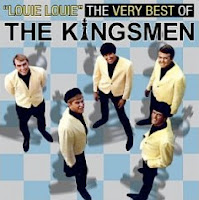 Based on the personal emails I’ve received as well as a rather significant increase in the number of hits on my blogspot the past couple of days, my previous entry on the mondegreen would seem to have been a popular success.
Based on the personal emails I’ve received as well as a rather significant increase in the number of hits on my blogspot the past couple of days, my previous entry on the mondegreen would seem to have been a popular success.
For the record, there are several websites devoted to mondegreens, so I can't claim any originality in that regard. I probably should have referred to a couple of websites in my earlier entry that collect mondegreens, at least those dedicated to misheard popular song lyrics:
www.kissthisguy.com
and
www.amiright.com
There are also a couple books I’m aware of that collect mondegreens, and there are probably several more of which I’m unaware: Charles Grosvenor, Jr., Hold Me Closer Tony Danza, and Gavin Edwards, Scuse Me While I Kiss This Guy.
I do hope that my previous blog entry hasn’t left readers with the impression that my view of mondegreens is that they are simply another form of widespread or popular "error," that is, that I was trying to diminish their (unwitting) achievement. Rather, I was trying to illustrate how mondegreens can be highly creative (the writing of an entirely new song, as it were), but also, in psychoanalytic terms, how the mondegreen has the potential for activating meaning(s) that were repressed or unacknowledged in the original set of lyrics. Moreover, there is at least one popular song lyric that was sung differently than in the form it is widely known in print. According to amiright.com, The Beatles’ "Ticket to Ride" is known in its "incorrect" form. Listeners who have claimed to hear
She’s got a ticket to Rye [as in the town in East Sussex] and she don't care
are not, in fact, hearing “incorrectly”—that’s the way The Beatles sang it. As sung, the song lyric is not
She’s got a ticket to ride and she don't care
According to amiright.com:
The Beatles cut the record, it was confusing to U.S. audiences, the record execs changed the title and lyrics. The song was never re-recorded. Listen carefully--you hear no ‘d’ sound in the word. Thus, Rye isn’t a misheard lyric. This is according to Casey Kasem.
How many bands in the history of rock have covered "Ticket to Ride," never knowing that they were singing the lyric incorrectly? Of course, it doesn't really matter. Referring in my previous entry to Dave Marsh’s book Louie Louie, I was trying to reiterate a point made throughout his book that the lesson many early rock and rollers learned from the controversy over the lyrics to “Louie Louie” was that the best rock lyrics should be purposely enigmatic. Hence, aural ambiguity isn't an accident, but necessary for the best rock lyrics to resonate, to be provocative. More abstractly put, rock lyricists exploit the susceptibility of messages to be deformed when received by the listener: they exploit the potential deformation made possible through the electronic transformation of messages. Although there is a widespread rumor (perhaps true) that the lead singer for Iron Butterfly was so heavily intoxicated that the words, "In the garden of eden," emerged in slurred form as, "In-a-gadda-da-vida," my own view is that the band's decision to leave them in their garbled version was absolutely brilliant, and no doubt contributed in no small way to the success of the song. How mysterious and enticing, how provocative, how mystery-laden those nonsense syllables were to a young generation of listeners.
The aural ambiguity enabled by the homophone hence isn't merely an "accident" that occurs in the transmission of the message, but instead reveals the received nature of the message itself. Of course, it doesn’t help when, for instance, The Kingsmen recorded "Louie Louie" with the microphone hanging from the ceiling so that there was no way the lyrics could be properly heard--but this is yet another instance of the interference that is inherently part of any electronically transmitted message. How many popular songs are themselves about this interference?
I’ve Got To Get a Message to You
Telephone Line
Hanging on the Telephone
Memphis
Operator
I made this list off the top of my head. Some enterprising person ought to assemble a CD compilation of such songs, to be called, what? Maybe The Girl With Colitis Goes By.
Monday, January 14, 2008
Friday, January 8, 1960
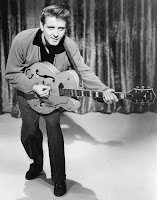 "...But there ain't no cure for the summertime blues..."
"...But there ain't no cure for the summertime blues..."
According to the webpage www.eddiecochran.info, on January 8, 1960, rocker Eddie Cochran--perhaps most famous for "Summertime Blues"--completed his last formal studio recordings, at Goldstar Studio in Hollywood. The next day, he left for an extended tour of the UK, arriving there on January 10th in order to join up with the Gene Vincent Show. Several popularly successful television performances featuring Cochran and Gene Vincent were broadcast in the UK over the next several weeks.
As is well known, Eddie Cochran never left the UK alive, having been killed slightly over three months after his arrival, the result of an automobile accident that occurred near 12 midnight on April 16th, 1960; he died from his injuries the next afternoon. (I note in passing that author Albert Camus was killed in an automobile accident on January 4, 1960.) In an improbable twist, according to www.eddiecochran.net, the name of the cab driver that fateful night was--George Martin . . . not the George Martin who would later, famously, produce The Beatles, but the serendipity is startling. Perhaps especially so, since one of the earliest known recordings of The Beatles (or, more precisely, three-quarters of the band that would become The Beatles), found on The Beatles' Anthology 1 (1995), is virtually a note-by note copy of Eddie Cochran's "Hallelujah, I Love Her So," recorded by the future Beatles sometime during the spring of 1960.
"Hallelujah, I Love Her So," released in the United States in October 1959, was the last single released in the UK during Cochran's lifetime, released in the UK in January, 1960, no doubt in order to coincide with his UK tour (although I strongly suspect that such extended appearances would not have called "tours" in those days). No doubt John, Paul, or George--or all three--picked up the single sometime soon after its UK release; one strongly suspects that while Cochran didn't appear in concert in Liverpool during his last tour, he made concert appearances (e. g., Manchester) that would not have been impossible for the young lads to attend.
Although John Lennon was always forthcoming about being an Elvis Presley fan, at the time Elvis wasn't doing much recording: he was in the Army--and, on January 8, 1960, Elvis was in Germany, celebrating his 25th birthday. His Army service was coming to an end, but he still had a few weeks left.
Happily, Eddie Cochran was, deservedly so, inducted into the Rock and Roll Hall of Fame in 1987.


